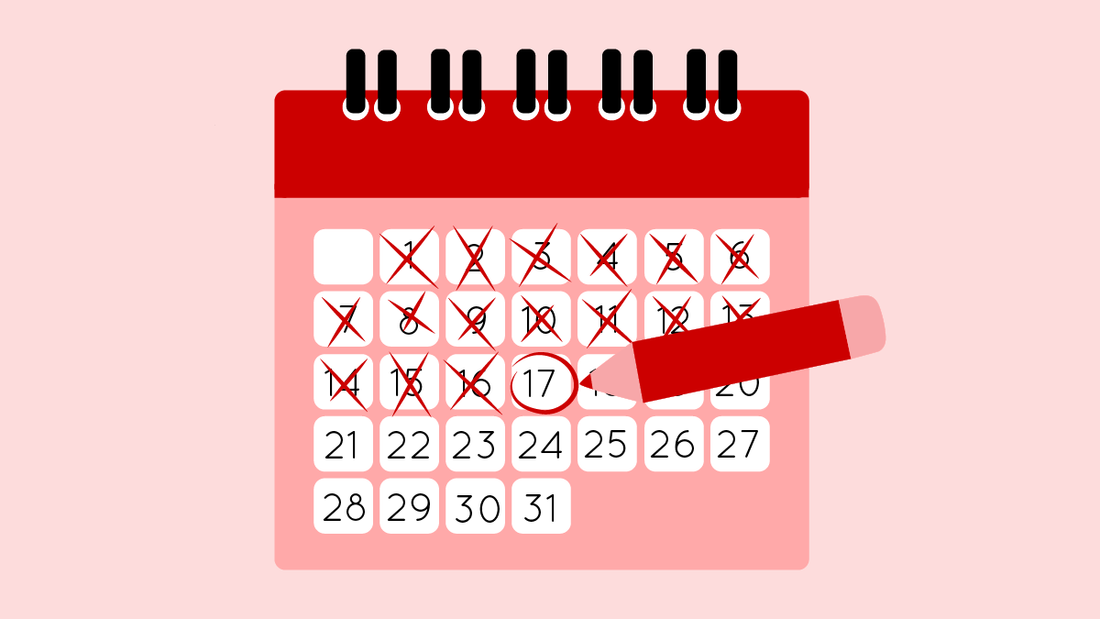This article is written by medical professional Alice Byram, whom you can read more about at the end of the article.
Here again so soon? Early periods can sometimes take you by surprise but the causes can often be easily explained. We’ll have a look at reasons for the early period and share some tips on how to regulate your menstrual cycle.
What counts as an early period?
An early period can be bleeding again just days after your last period or two weeks before you expect the next one to arrive. It can be caused by hormonal and/or lifestyle changes which disrupt the balance of your body.
Why is my period early?
Imbalanced hormones are the main cause for an early period. They can become unbalanced by:
- Taking (or forgetting to take) contraceptive pills, or emergency contraception
- Stress or anxiety can release stress hormones that can alter your flow or cycle, being an important reason why your period came early.
- Abrupt weight loss or weight gain
- Not getting enough sleep.
- Puberty or menopause. When your body goes through changes, hormones fluctuate.
Why is my period two weeks early?
Apart from imbalanced hormones, an early period, or what seems to be an early period, can also appear during ovulation. This is usually no reason to be concerned. The ovulatory phase occurs more or less two weeks after you’ve had your last period and you may see some spotting. It will usually have a different color to your regular period. It may have a more brownish or pinkish tinge.
If this is your case, having a menstrual cup may be very handy. Different than tampons, a menstrual cup won’t dry you out, making it a healthier solution to your body. Menstrual cups are also more comfortable to wear than a pads, so if you prefer to not even feel the spotting, I’d recommend you to check Ruby Cup.
When is a period not a period?
Many women experience some sort of spotting during some menstrual cycles, which can easily be mistaken as the beginning of a new period. It can be due to ovulation as mentioned previously or hormone imbalance or pregnancy.
If you’ve unprotected sex and the spotting occurs around when you’d expect your next period, it may be a sign that a fertilized egg has implanted in your uterus. This is called implantation bleeding. If you think that you may be pregnant, take a pregnancy test bearing in mind you might have to wait a couple of weeks in order for a pregnancy to show up as positive. Each pregnancy test manufacturer is different, so read the instructions. If you are pregnant consult your doctor about your next steps.
An early period could also indicate the start of an irregular menstrual cycle. This can be caused by a temporary imbalance in your hormones due to lifestyle changes. However, it can also be a sign of Polycystic Ovary Syndrome. More on that in our posts about PCOS and irregular periods.
3 easy steps to better manage an early period
1) Start tracking your period
A good trick to get to know your flow and cycle is to start tracking it. Keeping track will help you understand the rhythm of your menstrual cycle and easily detect irregularities. This means you will also know when any spotting may be due to ovulation. You can use an app for this or simply make a note on your paper or online calendar.
2) Take care of yourself - physically and emotionally
If you’re not getting enough sleep, feeling extremely stressed about something or are not eating a healthy diet, your body will feel it. This may lead to an early or missed period.
Your menstrual cycle is like a health report card. So, if you normally have a regular menstrual cycle that suddenly becomes irregular, you need to see your doctor. If there is no obvious medical cause, then it could be a sign that you need to slow down and take better care of yourself:
- Eat healthily and maintain a balanced diet throughout the month. Avoid rapid weight gain or loss, as this can change your hormone levels and make your period early, or delayed.
- Sleep enough for the lifestyle you lead. If you have problems sleeping think about sleep hygiene.
- Relax. Stress can cause early periods! If you have a busy lifestyle, or stressful job, try to make sure you de-stress at the end of each day. Anxiety and emotions can put extra stress on your body, which will affect your hormonal balance. Put your feet up, it’s good for you!
Related Post: What to Eat Before, During and After Your Period: A Helpful Guide
3) Use a period product that works for you
Using the right menstrual product can make early periods easy to manage. Menstrual cups are extremely portable, so you can be prepared for any inconvenience, and reusable, so you don’t need to worry about running to a pharmacy to get a disposable product. The Ruby Cup is the best for beginners ,is healthy and non-absorbent and can even be worn when you have a very light flow, or in the days before your period arrives. You will be ready for anything!

Check our Beginner’s Guide to a Menstrual Cup to find out more. It's also practical when you’re about to enter the ovulatory phase and don’t want to stain your underwear with spotting. Just pop in your menstrual cup when you think you are about to start your period even if you haven’t noted any menstrual flow yet. The medical-grade silicone does not dry you out and you can wear it for up to 8 hours without any worries.
When to see a doctor
Early periods can be caused by lifestyle factors but can sometimes indicate other health problems. If you have been sexually active and could be pregnant, visit your doctor for a consult – early periods can sometimes be a sign of pregnancy or implantation bleeding. There are also non-pregnancy related medical causes which may be nothing to worry about but seeing a health professional will put your mind at rest and, if you do have something, you will receive the right treatment early on.
_________________________________
Written by Dr Alice Byram Bsc Med & Surg UMA MA Hons MML Cantab
Dr Alice Byram was born in England to a French-British family. Following on from a degree in Spanish from the University of Cambridge, she went to Spain to study medicine. On her return to the UK, she worked in Emergency Medicine for several years before recently returning to Barcelona.
 Your Account
Log in
Your Account
Log in
 Basket
Basket



